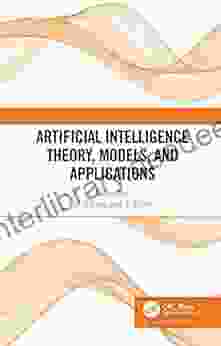Artificial Intelligence: Theory, Models, and Applications

Artificial intelligence (AI) is the simulation of human intelligence processes by machines, especially computer systems. AI research has been highly successful in developing effective techniques for solving a wide range of problems, from game playing to medical diagnosis. However, AI is also a controversial field, with some people arguing that it could lead to the development of superintelligent machines that could pose a threat to humanity.
In this article, we will explore the theoretical foundations of AI, discuss different AI models, and examine some of the most important applications of AI. We will also consider the ethical implications of AI and discuss the future of this rapidly developing field.
5 out of 5
| Language | : | English |
| File size | : | 104068 KB |
| Screen Reader | : | Supported |
| Print length | : | 480 pages |
Theoretical Foundations of AI
The theoretical foundations of AI are based on the idea that intelligence can be decomposed into a set of rules or algorithms. These rules can be used to create computer programs that can perform tasks that would normally require human intelligence.
There are many different approaches to developing AI systems. Some of the most common approaches include:
- Symbolic AI: Symbolic AI systems use symbolic representations to represent knowledge and to reason about the world. These systems are typically based on logic and can be used to solve problems that require complex reasoning.
- Connectionist AI: Connectionist AI systems use artificial neural networks to represent knowledge and to learn from data. These systems are typically based on the human brain and can be used to solve problems that require pattern recognition and learning.
- Evolutionary AI: Evolutionary AI systems use evolutionary algorithms to evolve solutions to problems. These systems are typically based on the principles of natural selection and can be used to solve problems that require optimization.
AI Models
There are many different AI models that have been developed. Some of the most common AI models include:
- Expert systems: Expert systems are computer programs that are designed to emulate the knowledge and reasoning of human experts. Expert systems are typically used to solve problems in specific domains, such as medical diagnosis or financial planning.
- Neural networks: Neural networks are artificial neural networks that are used to learn from data. Neural networks can be used to solve a wide range of problems, including pattern recognition, image processing, and natural language processing.
- Decision trees: Decision trees are decision-making models that use a tree-like structure to represent decisions. Decision trees can be used to solve problems that require complex decision-making.
- Bayesian networks: Bayesian networks are graphical models that are used to represent probabilistic relationships between variables. Bayesian networks can be used to solve problems that require reasoning under uncertainty.
- Support vector machines: Support vector machines are machine learning models that are used to classify data. Support vector machines can be used to solve problems that require high-dimensional data classification.
Applications of AI
AI has a wide range of applications in a variety of fields, including:
- Healthcare: AI is used in healthcare to diagnose diseases, develop new treatments, and improve patient care. For example, AI systems can be used to detect cancer cells, predict the risk of heart disease, and develop personalized treatment plans.
- Finance: AI is used in finance to predict stock prices, identify fraud, and manage risk. For example, AI systems can be used to develop trading strategies, detect money laundering, and improve credit scoring.
- Manufacturing: AI is used in manufacturing to automate tasks, improve quality control, and optimize production. For example, AI systems can be used to control robots, inspect products, and predict maintenance needs.
- Transportation: AI is used in transportation to improve traffic flow, reduce accidents, and optimize routing. For example, AI systems can be used to control traffic lights, detect road hazards, and develop self-driving cars.
- Government: AI is used in government to improve public services, enhance security, and make better decisions. For example, AI systems can be used to automate tax processing, detect fraud, and predict crime.
Ethical Implications of AI
The rapid development of AI has raised a number of ethical concerns. Some of the most important ethical concerns about AI include:
- Job displacement: AI could lead to the displacement of jobs as machines become more capable of performing tasks that are currently done by humans. This could have a significant impact on the economy and on society as a whole.
- Bias: AI systems can be biased, which could lead to unfair or discriminatory outcomes. For example, an AI system that is used to make hiring decisions could be biased against certain groups of people, such as women or minorities.
- Safety: AI systems could pose a safety risk if they are not properly designed and tested. For example, an AI system that is used to control a self-driving car could make a mistake that could lead to an accident.
- Autonomy: AI systems could become increasingly autonomous, which could raise concerns about who is responsible for the decisions that they make. For example, an AI system that is used to make military decisions could make a decision that could lead to war.
The Future of AI
AI is a rapidly developing field, and it is difficult to predict the future of AI with certainty. However, it is clear that AI will continue to have a major impact on our lives in the years to come. AI is likely to play a key role in solving some of the world's most pressing problems, such as climate change, poverty, and disease. However, it is also important to be aware of the ethical risks of AI and to take steps to mitigate these risks.
The future of AI is in our hands. We must work together to ensure that AI is developed and used in a way that benefits humanity as a whole.
5 out of 5
| Language | : | English |
| File size | : | 104068 KB |
| Screen Reader | : | Supported |
| Print length | : | 480 pages |
Do you want to contribute by writing guest posts on this blog?
Please contact us and send us a resume of previous articles that you have written.
 Book
Book Chapter
Chapter Text
Text Story
Story Library
Library Paperback
Paperback E-book
E-book Magazine
Magazine Newspaper
Newspaper Sentence
Sentence Bookmark
Bookmark Glossary
Glossary Bibliography
Bibliography Preface
Preface Annotation
Annotation Scroll
Scroll Tome
Tome Bestseller
Bestseller Classics
Classics Library card
Library card Memoir
Memoir Reference
Reference Dictionary
Dictionary Thesaurus
Thesaurus Character
Character Resolution
Resolution Librarian
Librarian Stacks
Stacks Periodicals
Periodicals Study
Study Scholarly
Scholarly Lending
Lending Reserve
Reserve Academic
Academic Journals
Journals Rare Books
Rare Books Literacy
Literacy Dissertation
Dissertation Storytelling
Storytelling Textbooks
Textbooks Joe Writeson
Joe Writeson Gary W Burnett
Gary W Burnett Charlie Landsborough
Charlie Landsborough Jason Anspach
Jason Anspach Pauline Maier
Pauline Maier H D Walker
H D Walker Todd Huizinga
Todd Huizinga Eryn Carpenter
Eryn Carpenter Erica Stewart
Erica Stewart James Griffiths
James Griffiths Dr Sharon A Mitchell
Dr Sharon A Mitchell Gerard Kelly
Gerard Kelly Fiona Stapley
Fiona Stapley Markus Wagner
Markus Wagner Rosemary Say
Rosemary Say Doug Morneau
Doug Morneau Julie Houston
Julie Houston Tom Piazza
Tom Piazza Christine Lynn Herman
Christine Lynn Herman Lois Walfrid Johnson
Lois Walfrid Johnson
Light bulbAdvertise smarter! Our strategic ad space ensures maximum exposure. Reserve your spot today!
 Casey BellFollow ·8.3k
Casey BellFollow ·8.3k Ross NelsonFollow ·17.1k
Ross NelsonFollow ·17.1k Melvin BlairFollow ·15.2k
Melvin BlairFollow ·15.2k Miguel de CervantesFollow ·17.3k
Miguel de CervantesFollow ·17.3k Ike BellFollow ·19k
Ike BellFollow ·19k Mason PowellFollow ·3.8k
Mason PowellFollow ·3.8k Dakota PowellFollow ·8k
Dakota PowellFollow ·8k Ernest ClineFollow ·4.4k
Ernest ClineFollow ·4.4k

 Bo Cox
Bo CoxDiscover the Enchanting Allure of Collingwood, Ontario,...
Nestled amidst the breathtaking landscape of...

 Ralph Ellison
Ralph EllisonThe Street of Clocks Poems: A Poetic Journey Through Time
Welcome to The Street...

 Dwight Blair
Dwight BlairCritical Political Economy of the Middle East and North...
The Middle East and...

 Deion Simmons
Deion SimmonsPerfect Strategies For Painting Amazing Marine Creatures...
Gouache is a...

 Hugh Bell
Hugh BellThe American Republic: Constitution, Tendencies, and...
The American Republic,...
5 out of 5
| Language | : | English |
| File size | : | 104068 KB |
| Screen Reader | : | Supported |
| Print length | : | 480 pages |













